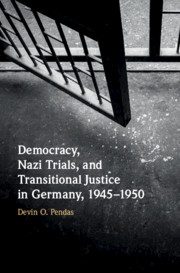Book contents
- Democracy, Nazi Trials, and Transitional Justice in Germany, 1945–1950
- Democracy, Nazi Trials, and Transitional Justice in Germany, 1945–1950
- Copyright page
- Contents
- Acknowledgments
- Introduction
- 1 Allied Justice and Its Discontents
- 2 Allied Policy toward German Courts
- 3 Debating Crimes against Humanity in the West
- 4 Debating Democracy in the East
- 5 The Trials That Did Not Happen
- Epilogue
- Bibliography
- Index
2 - Allied Policy toward German Courts
Published online by Cambridge University Press: 11 September 2020
- Democracy, Nazi Trials, and Transitional Justice in Germany, 1945–1950
- Democracy, Nazi Trials, and Transitional Justice in Germany, 1945–1950
- Copyright page
- Contents
- Acknowledgments
- Introduction
- 1 Allied Justice and Its Discontents
- 2 Allied Policy toward German Courts
- 3 Debating Crimes against Humanity in the West
- 4 Debating Democracy in the East
- 5 The Trials That Did Not Happen
- Epilogue
- Bibliography
- Index
Summary
This chapter examines the development of Allied policy toward German courts in all four occupation zones. The chapter begins by analyzing the limitations in the denazification of the German legal profession. It then turns to the policies adopted by the four occupying powers toward granting German courts jurisdiction over Nazi crimes. Allied Control Council Law No. 10 of December 1945 allowed the occupation authorities to grant German courts jurisdiction over Nazi crimes against humanity, which included crimes against German citizens. In the British and French Zones, German courts were granted general jurisdiction over Nazi crimes against humanity. In the American zone, fears of German pushback led the Americans to authorize the Germans to prosecute Nazi crimes only under domestic law, not as crimes against humanity. In the Soviet Occupation Zone, a complex process of politicization took place. At first the Soviets allowed Germans to proseucte Nazi crimes against humanity in criminal courts. They the folded crimes against humanity prosecutions into the broader program of denazification. This led to an increased politicization of these trials, though they did not become complete sham trials until the so-called Waldheim Trials of 1950.
Keywords
- Type
- Chapter
- Information
- Publisher: Cambridge University PressPrint publication year: 2020

